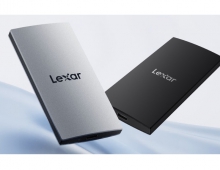
Lexar Launches the NM990 PCIe 5.0 SSD
Lexar is thrilled to debut its new next-gen solid-state drive—the NM990 M.2 2280 PCIe 5.0 NVMe SSD, engineered for High-end gamers, professional creators and AI developers. Leveraging next-generation PCIe 5.0 technology, the NM990 PCIe 5.0 SSD delivers speeds up to 14,000MB/s read and 11,000MB/s write1, almost two times faster than typical Gen 4 SSDs2. It provides superior performance for serious gamers and professional rendering. The NM990 PCIe 5.0 SSD includes Thermal Defender Technology, and is integrated 8-channel controller and graphite heat dissipation decals to deliver up to 23%2 better power consumption management, ensuring smoother and more efficient performance.
The drive features DRAM Cache and SLC dynamic cache delivers random read/write speeds up to 2000/1500K IOPS1, significantly enhancing data transfer speeds to reduce wait times and improve system responsiveness whether you’re blazing through a AAA game, refining high-res renders, or deftly processing your most comprehensive AI projects. With a rated capacity of up to 3000 TBW (4TB) ensuring excellent reliability for heavy workloads over the years and support for Microsoft DirectStorage3, this drive offers faster load times and elevate the overall gaming experience to new levels. Moreover, users can use the Lexar DiskMaster SSD Management tool to perform firmware updates, manage the drive and its data, and monitor drive health.
The NM990 M.2 2280 PCIe 5.0 NVMe SSD is available from 1TB to 4TB, and users can expect to get even more space than a standard SSD of the same listed capacity4.
Disclosures
1 Speeds based on internal testing. Actual performance may vary.
2 The result is based on a comparison between the NM990 4TB (PCIe 5.0) and the NM790 4TB (PCIe 4.0). Speeds based on internal testing. Actual performance may vary.
3 This feature will only work if the computer meets the working requirements of DirectStorage and the game is compatible with DirectStorage.
4 Actual usable memory capacity may vary. 1GB equals 1 billion bytes.





















